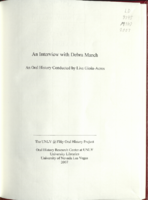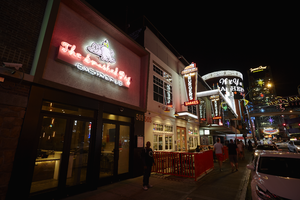Search the Special Collections and Archives Portal
Search Results

Transcript of interview with Will Provance by David G. Schwartz, July 14, 2016
Date
Archival Collection
Description
Text

Transcript of interview with Ruth Urban by Barbara Tabach, August 24, 2015 and September 16, 2015
Date
Archival Collection
Description
In this interview, Urban discusses her upbringing in Las Vegas, and childhood friendships, many which came from within the Jewish community. She talks extensively about her professional career and passion for mediation as a strategy for problem-solving. In addition, Urban describes her community service commitments over the years, including her current role with Nevadans for the Common Good. Urban married Andrew Urban Jr. in 1983, and the couple have a son, Andrew Urban III.
Text

Transcript of interview with Blaine Benedict by Barbara Tabach, November 12, 2015
Date
Archival Collection
Description
Throughout this interview, Blaine shares stories of his father, Alvin Benedict. Al owned and operated Benedict and Remy Plumbing Business for a few years before entering into casino management. He is considered to be the first college educated executive and had an illustrious executive career at the MGM. He also was a co-founder with Susan and Irwin Molasky of Nathan Adelson Hospice.
Text

Transcript of interview with Debra March by Lisa Gioia-Acres, February 21, 2007
Date
Archival Collection
Description
Text

Transcript of an interview with Kenneth Fong by Lois Goodall on February 22, 2014
Date
Archival Collection
Description
Text
Straus, Joyce, 1935-2013
Bio taken from the "about" section of the Joyce Straus - Foundation for the Arts website:
"Joyce Elise Straus, (nee Lazowick), was born Oct. 1, 1935, in Philadelphia, to her parents Jacob and Frances. Joyce came to Las Vegas in 1961 with her husband of 56 years, the late Dr. Neil B. Straus, to raise their family.
Person
Audio clip of an interview with Kenneth Fong by Lois goodall on February 22, 2014
Date
Archival Collection
Description
Sound

Transcript of interview with Hershel Brooks by Barbara Tabach, December 8, 2016
Date
Archival Collection
Description
Hershel Brooks was born December 3, 1930 in Brooklyn, New York. He was raised in an orthodox Jewish household, along with his four siblings, and attended Jewish community schools before pursuing his rabbinical studies. He studied at TelsheYeshiva in Cleveland, Torah Vodaath in New York, and Jewish Theological Seminary in New York. Before assuming his first rabbinical position, Brooks married his wife, Alma, and graduated with his BA from the University of Miami. He was first hired by a conservative congregation in Miami, and subsequently led congregations in Savannah, Georgia, Greensboro, North Carolina and Philadelphia, Pennsylvania. Eventually, he joined a temple in Anaheim, California, where he served for twenty years. In 1996, Brooks retired to Las Vegas. He was soon asked to lead services at Temple Bet Knesset Bamidbar [BKB] twice a month as its rabbi. He still is active at BKB, though he retired in 2011. In this interview, Brooks reflects on his family background and the path that lead to his becoming a rabbi in the Conservative Jewish Movement. He talks about his career, including his involvement with BKB as well as other Jewish community service, including facilitating adult bar mitzvah classes and serving on the local Rabbinical court of Judaism, known as Bet Din.
Text

Photographs of Smashed Pig sign, Las Vegas (Nev.), June 28, 2017
Date
Archival Collection
Description
Site address: 509 Fremont St
Sign owner: Martin Swift
Sign details: The original construction year of this building dates to 1952. Previous to the Smashed Pig opening in this location it was a tattoo parlor. This English Gastropub opened in 2015.
Sign condition: 4.5- but some neon may be needing a repair on the sign but still is in good quality.
Sign form: Entrance sign
Sign-specific description: Right above their entrance they have a rectangular steel backing with "The Smashed Pig" in white cursive letters, there is skeletal neon making these words illuminate pink at night time. Underneath this states "GASTROPUB" in print skeletal neon that whites up white. Above this rectangular sign is a plastic back lit sign pig which depicts alcohol laying on top of it.
Sign - type of display: Neon and backlit plastic sign
Sign - media: Plastic and steel
Sign - non-neon treatments: Plastic back lit sign
Sign environment: Located in the East Fremont District. To the East of this property is the Griffin, and to the West is Flippin Good Burgers.
Sign manufacturer: Las Vegas Signs
Sign - date of installation: Late 2015
Sign - thematic influences: The pig sign that they have above their entrance looks smashed, the slang term for drunk especially since they depict bottles of alcohol sitting upon the pig. Though the pig looks physically smashed down. This helps relate to their theme since the image they depicts the name of their property.
Sign - artistic significance: The theme is represented in the name and the sign since it is a gastropub where you can drink and eat good food.
Survey - research locations: Smashed Pig website _https://www.thesmashedpig.com/ , Eater Las Vegas https://vegas.eater.com/2015/3/24/8281761/first-word-the-smashed-pig-gastropub-to-fremont-street, Las Vegas Weekly https://lasvegasweekly.com/dining/reviews/2016/feb/10/smashed-pig-british-pub-fremont-street-downtown/#/0 , discussion with owner
Survey - research notes: On the Smashed Pig website they state that the definition of their gastropub is a pub that specializes in serving high quality food.
Survey - other remarks: Martin Swift and his late wife Linda Rodriguez opened this location in 2015 after being trained by renowned chef Nobu Matsuhisa as well as opening the Hachi restaurant at the Red Rock.
Surveyor: Emily Fellmer
Survey - date completed: 2017-08-22
Sign keywords: Neon; Plastic; Backlit; Steel; Fascia; Building-front design
Mixed Content

